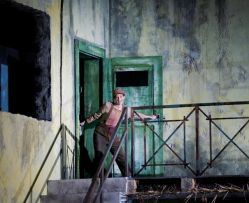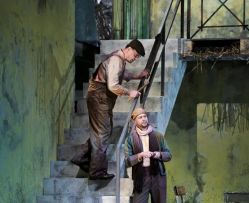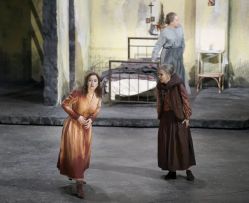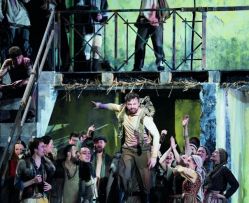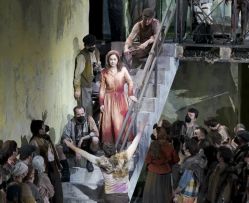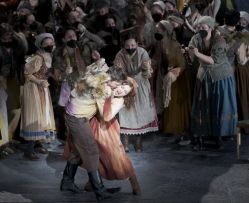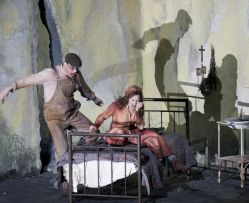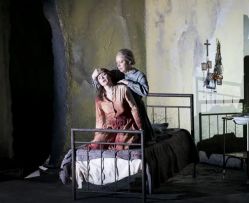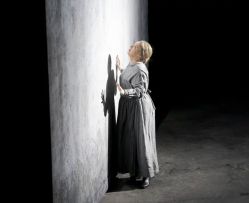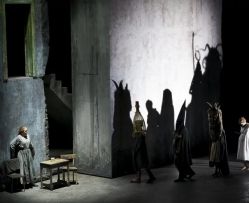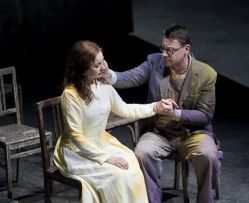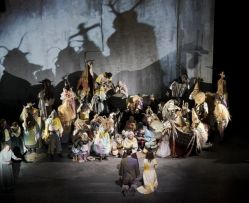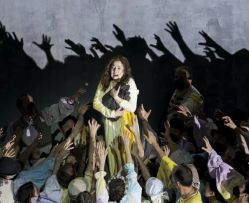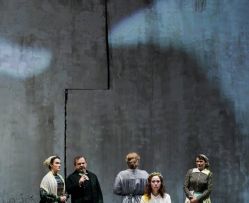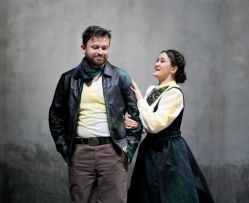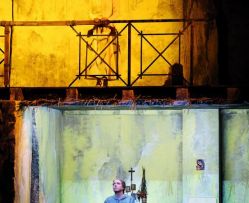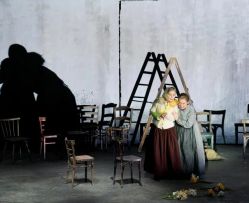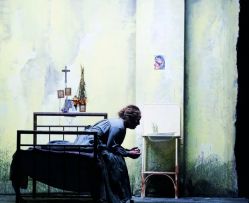Opera in three acts (1904)
Libretto by Leoš Janáček
New production of Theater an der Wien
Based on the play Ihre Ziehtochter by Gabriela Preissová
In Czech with German surtitles
New premiere date:
Saturday, 19 February 2022, 7 pm until 9.30 pm (one intermission)
Performances:
21 | 24 | 26 | 28 February 2022 | 7 pm until 9.30 pm (one intermission)
Intoduction matinée:
13 February 2022, 11 am
Information:
The Theater an der Wien is not spared from the omicron wave either and therefore the 16.02. planned premiere to be postponed to February 19, 2022 due to Corona. All tickets already reserved for the performances on February 19, 21, 24, 26 and 28. purchased remain valid. Ticket holders for the performance on February 16 will be contacted personally by our ticket office to rebook to another date.
Cast
Synopsis
Jenůfa waits fearfully to learn whether Števa, the man she loves and whose child she is secretly carrying, will be drafted into the army or not. If he is he would not be able to marry her, the child would have no father and she could only avoid the disgrace by killing herself. But Števa is not conscripted, and returns, dancing, to the village with some of the other recruits. The celebrations are interrupted by the churchwarden’s widow, Jenůfa’s stepmother. She presents the drunk Števa with an ultimatum: before he marries Jenůfa he must stay sober for a year. That Števa will now stay in the village greatly annoys Laca who has long been in love with Jenůfa, although she treats him with nothing but contempt. When the two of them are alone his jealousy erupts and he cuts her cheek with a knife. Six months later – it is winter – Jenůfa has secretly given birth to her child. While she is sleeping, the churchwarden’s widow fetches Števa into the house and demands that he take responsibility for Jenůfa and his child. But that role does not interest him at all and besides, since Laca disfigured her he finds Jenůfa’s appearance revolting. All he can do is give her some money for the child. And anyway he is now engaged to Karolka, the mayor’s daughter. No sooner has Števa left the house than Laca arrives. He still wants Jenůfa, but Števa’s child is a problem, so the churchwarden’s widow decides to tell a lie: she says the child is dead. Fearing that the child will ruin Jenůfa’s prospects, the widow turns the lie into the truth and drowns the newborn. She tells Jenůfa that the child died while she was in her sickbed with a fever. When she sees the gentle way that Laca consoles her she tries to tell herself that she has done the right thing. But she shows increasing signs that her crime is troubling her… It is spring, and the wedding of Jenůfa and Laca is about to take place. The widow, though, is on the point of a nervous breakdown. Števa and Karolka have arrived and the girls of the village sing a wedding song. Suddenly, screams ring out: the melting ice has exposed the baby’s dead body. Jenůfa recognises it as hers and is suspected of murder. The widow, however, confesses her guilt and explains her motive. Jenůfa forgives her.
Leoš Janáček was 62 years old before he received widespread recognition as a composer. He owed this late success to the author and theatre and music critic Max Brod who saw his opera Její pastorkyňa (Her Stepdaughter) at the National Theatre, Prague, in 1916 and subsequently championed him. Janáček based the libretto on the play of the same name by Gabriela Preissová. Having started work on it in 1894/95, Janáček completed his third opera after a long break in 1903. He tried without success to have the work staged in Prague, and it was first performed in Brno in 1904. For subsequent performances Janáček was forced to make revisions: He again tried to have it given in Prague, and finally succeeded – allegedly thanks to the intervention of some friends – in 1916, although only on condition that Karel Kovařovic, the director of the National Theatre, subject the work to careful revision. Jenůfa’s sad life, which even becomes tragic following the killing of her child, unfolds in a small village with complex relationships: at the centre of these entanglements is the village mill, the home of Grandmother Buryja, her grandchildren, the half-brothers Števa and Laca, her daughter-in-law, the churchwarden’s widow and the latter’s stepdaughter Jenůfa. The protagonists’ close family ties heighten their emotionality: this is shown both by Laca’s explosion of jealousy and by the decision of the churchwarden’s widow to make her lie come true and kill Jenůfa’s child. The extremely strict moral concept of the village community does the rest – escape from these confines is not an option. Její pastorkyňa is a tragedy full of expressive music which Janáček achieves in part with repetitive structures which he then distorts and intensifies. The way Janáček renders the Czech language in musical form is one aspect that is regarded as outstanding, but is at the same time one that made performance of the work in other languages difficult. For the German-language premiere at the Vienna Court Opera, Max Brod created a German translation and Janáček modified parts of the vocal score. And with a new title that was more suitable for international audiences – Její pastorkyňa became simply Jenůfa – the production was a major success in Vienna.
About the opera
Leoš Janáček was 62 years old before he received widespread recognition as a composer. He owed this late success to the author and theatre and music critic Max Brod who saw his opera Její pastorkyňa (Her Stepdaughter) at the National Theatre, Prague, in 1916 and subsequently championed him. Janáček based the libretto on the play of the same name by Gabriela Preissová. Having started work on it in 1894/95, Janáček completed his third opera after a long break in 1903. He tried without success to have the work staged in Prague, and it was first performed in Brno in 1904. For subsequent performances Janáček was forced to make revisions: He again tried to have it given in Prague, and finally succeeded – allegedly thanks to the intervention of some friends – in 1916, although only on condition that Karel Kovařovic, the director of the National Theatre, subject the work to careful revision. Jenůfa’s sad life, which even becomes tragic following the killing of her child, unfolds in a small village with complex relationships: at the centre of these entanglements is the village mill, the home of Grandmother Buryja, her grandchildren, the half-brothers Števa and Laca, her daughter-in-law, the churchwarden’s widow and the latter’s stepdaughter Jenůfa. The protagonists’ close family ties heighten their emotionality: this is shown both by Laca’s explosion of jealousy and by the decision of the churchwarden’s widow to make her lie come true and kill Jenůfa’s child. The extremely strict moral concept of the village community does the rest – escape from these confines is not an option. Její pastorkyňa is a tragedy full of expressive music which Janáček achieves in part with repetitive structures which he then distorts and intensifies. The way Janáček renders the Czech language in musical form is one aspect that is regarded as outstanding, but is at the same time one that made performance of the work in other languages difficult. For the German-language premiere at the Vienna Court Opera, Max Brod created a German translation and Janáček modified parts of the vocal score. And with a new title that was more suitable for international audiences – Její pastorkyňa became simply Jenůfa – the production was a major success in Vienna.
